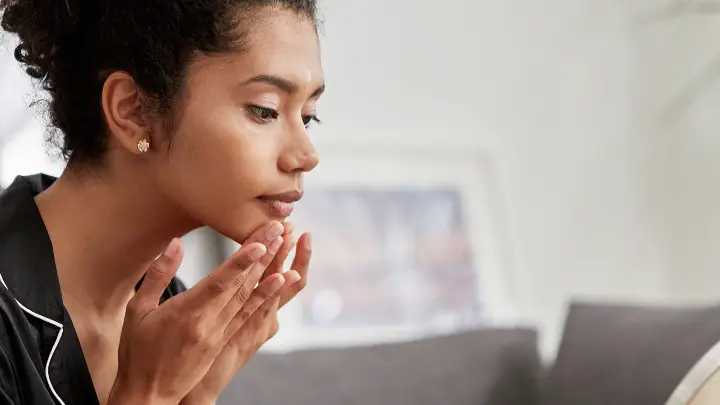Retinoids are one of the most common treatments prescribed by dermatologists to help with acne and its aftermath – they can reduce inflammation, stimulate new collagen production, and even improve your skin tone. But do retinoids really help acne scars?
The answer is yes. Retinoids are a powerful class of skincare ingredients that provide several benefits, including helping to improve the appearance of acne scars.
This article discusses how retinoids can help with acne scars, how long they take to work, and how to use them on acne scars. I’ll also give you some tips on how to get rid of acne scars, so keep reading.
Do retinoids help acne scars?
Yes, retinoids help acne scars.
They work by boosting the production of collagen and elastin, two proteins in the skin that are responsible for healing and repairing damaged tissue. This helps to plump up the skin, filling in acne scars and making them less visible.
Retinoids also help to reduce inflammation, further improving the appearance of acne scars. In addition, they increase the rate at which skin cells turn over, which helps to reduce the visibility of scars.
So if you want to reduce the appearance of acne scars on your skin, talk to your doctor or dermatologist about retinoids. They can help you figure out if retinoids are the right treatment for you and recommend effective products.
How long does it take for retinoids to fade acne scars?
The length of time it takes for retinoids to fade acne scars can vary depending on the severity and type of scarring. Generally, it can take about 2-3 months of consistent use before any noticeable changes in the appearance of the scars can be seen.
During this time, it’s important to keep in mind that retinoids are most effective when you use them consistently and properly. This means following the instructions on the label closely and avoiding over-exposure to sunlight.
Additionally, it’s important to be patient when using retinoids, as results can take some time to appear. If you do not see any improvements after 4 months, it’s best to consult with a dermatologist who can provide additional advice and treatment options.
How to use retinoids for acne scars
To use retinoids for acne scars, the first step is to consult with a dermatologist. Retinoids can be prescribed in different strengths and formulations, so it’s important to get the right advice from a medical professional.
Once you have gotten the right retinoid for your skin type, it’s time to start using it. Start by washing your face with a gentle cleanser and lukewarm water. Then, apply a thin layer of the retinoid to your face and allow it to absorb into your skin.
Be sure to follow up with a moisturizer and use sunscreen when going outside, as retinoids can make your skin more sensitive to the sun’s rays. With regular use, you should start seeing results within a few months.
What are the side effects of using retinoids to fade acne scars?
The most common side effects of using retinoids to fade acne scars include dryness, irritation, and peeling of the skin.
Retinoids can also cause sun sensitivity and result in sunburns if the skin is exposed to direct sunlight without adequate protection. In rare cases, side effects may include changes in skin color, severe itching, and burning.
If you’re using a retinoid product to treat acne scars, it’s important to be aware of these potential side effects and take steps to minimize them. Always use sunscreen when spending time outdoors and talk to your doctor if you experience any unusual symptoms.
Tips for getting rid of acne scars
- Exfoliate your skin regularly. This will help to remove dead skin cells, which can reduce the appearance of acne scars.
- Use topical treatments that contain active ingredients. These can help to fade dark spots and reduce the appearance of acne scars.
- Use a moisturizer daily. Look for products that contain hyaluronic acid as these will help hydrate your skin all day long.
- Invest in laser treatments. Laser treatments such as fractional laser resurfacing can help to reduce the appearance of scars.
- Get plenty of sleep and eat healthily. Both of these can help to improve skin health, which can reduce the appearance of scars.
With time and patience, you can have skin that looks and feels healthier.
FAQs

Do retinoids help with dark spots?
Yes, they do.
Retinoids are a popular treatment option for people looking to reduce the appearance of dark spots. They work by stimulating the skin’s cell turnover process, which helps to fade dark spots and smooth out the skin.
Is it OK to use retinol every night?
It’s okay to use retinol every night if your skin can tolerate it. Start by using it every other night and gradually increase frequency as your skin adjusts.
However, before you start using retinol every night, make sure to speak to a skincare expert. They’ll be able to advise you on the best way to use retinol for your skin type and concerns.
Can you use retinoids in the morning?
You can, but it’s not advisable.
The reason for this is that retinoids are photosensitive, which means they can cause irritation, redness, and peeling if exposed to sunlight. So if you want to get the best results possible from your retinoid product, use it before bed at night.
Takeaway
Retinoids work by increasing collagen and elastin production, which helps reduce the appearance of acne scars. They also help promote cell turnover and reduce inflammation, making them ideal for treating acne scars.
So if you’re looking to reduce the appearance of acne scars, retinoids may be worth a try.
Thanks for reading.
Visit Serum101 for more information on retinoids and acne.






